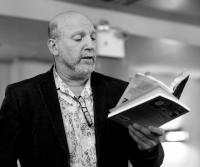The Lines That Antisemitism and Racism Draw
Reflections on White Jewish Intersectionality
Editor's Note: As Richard says on the following page, this project began when I solicited his work for #BlackArtMatters, a special issue of Unlikely Stories Mark V that was published in September, 2016. #BlackArtMatters, edited by Rosalyn Spencer, was focused on black writers and artists, and encouraged non-black critics to submit work about black art. Rosalyn and Richard don’t know each other, but she gave me permission to solicit his work, for reasons that will become apparent through this essay.
Richard told me he wouldn’t be able to make the deadline, and I didn’t think much more about it until November 7th, the day before Drumpf’s election, when he sent me a thirty-page essay on “Black Art Matters” in the form of a series of letters to me, which he drafted while traveling in August (and presumably edited since). When I received them, I saw them as the seeds to a bigger project (as did our Prose Editor, Alan Fyfe). But the world was, and is, changing so fast, that the three of us felt it best to go ahead and publish with minor revisions, leaving this essay as a look at black/Jewish relationships before the selection of antisemite Steve Bannon as Chief White House Strategist. It remains intelligent and insightful; we hope it will remain edifying for people trying to maneuver racial issues in this new world.
Richard, Alan and I are all Jewish, all men, and all—for most intents and purposes—white. This final category deserves the thorough examination Richard will now give.
Author's Note on the Title: I would not normally annotate my own letters, but since these are being published, and since their subject is an important and sensitive one, I want to explain the unconventional way in which I choose to spell antisemitism—no hyphen and, except in the title, no capitalization in the word at all. I wish I could remember the book in which I first encountered this spelling so that I could give credit where credit is due. Since I can’t, I will simply ask you, if you do recognize it, to send the information to me so I can have it for future reference. When Wilhelm Marr popularized the term “anti-Semitism” in 1879 so that Jew-hating would have a scientific and therefore objective and legitimizing label, he obviously did not consider the other Semitic peoples worthy of notice. The word, in other words, has a double oppression embedded in it, and so it would be much better if we had a word for Jew-hatred that, like Islamophobia, accurately and specifically named the object of the oppression it invokes. For this reason, I have sometimes tried in my writing to use Jew-hatred instead, but that phrase feels inadequate to me. The word hatred suggests an emotional, irrational, immediate response and therefore, for me, does not do justice to the long and unfortunately distinguished intellectual history which informs, and is used to justify, antisemitism—and which makes it a very different hatred from, say, anti-Arab racism. Indeed, anti-Arab racism has its own history and intellectual justification, separate and distinct from what Marr meant by anti-Semitism. Nonetheless, this does not make it okay, when using Marr’s original coinage, to ignore the fact that Arabs are also Semites. I realize that mine is an imperfect solution, especially since it covers only written language, but my hope is that spelling antisemitism as I do—as one word, without the hyphen, and without the capital S at the beginning of Semitic—because it de-emphasizes the reference to Semites, allows the word more easily to be perceived as it was originally coined, and as it is still most commonly used today, i.e., to mean the hatred of Jews.

Richard Jeffrey Newman has published two books of poetry, Words for What Those Men Have Done (Guernica Editions 2017) and The Silence of Men (CavanKerry Press 2006), as well as a chapbook, For My Son, A Kind of Prayer (Ghostbird Press 2016). In addition, he has co-translated three books of classical Persian poetry, most recently The Teller of Tales: Stories from Ferdowsi’s Shahnameh (Junction Press 2011). Newman is on the executive board of Newtown Literary a Queens-based literary non-profit and curates the First Tuesdays reading series in Jackson Heights, New York. He is Professor of English at Nassau Community College. His website is www.richardjnewman.com.


